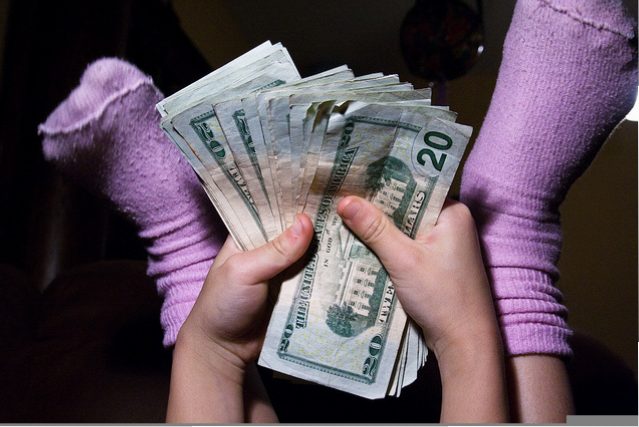Why do we go to work every day? To make money.
“By facilitating trade, motivating efficient production, and allowing the accumulation of capital to undertake large-scale projects, money should enrich life; it should bestow upon us ease, leisure, freedom from anxiety, and an equitable distribution of wealth. … The fact that money has become an agent of the opposite—anxiety, hardship, and polarization of wealth—presents us with a paradox.” ~ Charles Eisenstein.
What is one of the main considerations when choosing a career path? Whether you can make money and how much money you can make. We want to make as much money as possible. Why?
Because when you have a lot of money, not only do you have your bills paid and have “security” but you can buy all the things you want, get a large house, a cool car, go on fancy vacations and have lots of fun.
Then you’ll be happy—right?
Well… it does not really work that way.
It is true that a lack of financial resources can pose a strain on someone’s happiness and wellbeing and creates tremendous anxiety and stress in someone’s life. Wondering whether you can keep your house, feed your children, having to choose between buying food or paying the bills… these circumstances can be significant detractors for our happiness.
The relationship with money and happiness, however, is not a linear relationship. Studies that looked at how money affects self-reported happiness in multiple countries around the world show that once someone has their basic needs met and has a certain level of comfort, more money does not lead to more happiness. There is a point of diminishing returns.
Financial resources or income also plays a much smaller role in happiness than most people think. Research on happiness suggests that approximately 10 percent of the variation in people’s happiness is related to life circumstances (e.g. where you live, the kind of job you have, what kind of education you have, etc.) and income is only one part of that.
A whopping 50 percent of our happiness is attributed to what is called our “happiness set point,” which is thought to be mainly genetic (some people just have sunnier dispositions than others). That leaves 40 percent, which is related to intentional actions and attitudes.
This is why getting fancy stuff (a new car, a cool gadget, or even a new job or promotion) does not lead to lasting happiness. In the beginning we may experience a high or euphoria from getting something new or reaching a particular goal, but after a while the novelty wears off and we return to our baseline level of happiness, or happiness set point. That’s why you can never satisfy desire, you are always going to end up wanting more or something new.
In this video, one of the leading happiness experts, Sonja Lyubomirski, talks about this:
According to research by Lyubomirski and other leading happiness researchers, the number one predictor of happiness is the relationships we have with others and the sense of connectedness we have with our community.
Other things she mentioned are gratitude, being altruistic and helpful, being in the present moment, physical activity, having a sense of purpose and meaning, religious or spiritual beliefs and having an optimistic outlook.
Charles Eisenstein also talks about how as human beings we really long to be in connection with others. Unfortunately our money system and the way we think about ourselves—as discrete individuals who are separate from everything and everyone else—impedes this connection.
So, does money make us happy? Well, partially, but not really.
Not if it interferes with what truly matters to us: connection.
Love elephant and want to go steady?
Sign up for our (curated) daily and weekly newsletters!
Editor: Catherine Monkman
Photo: Steven Depolo/Flickr







Read 0 comments and reply